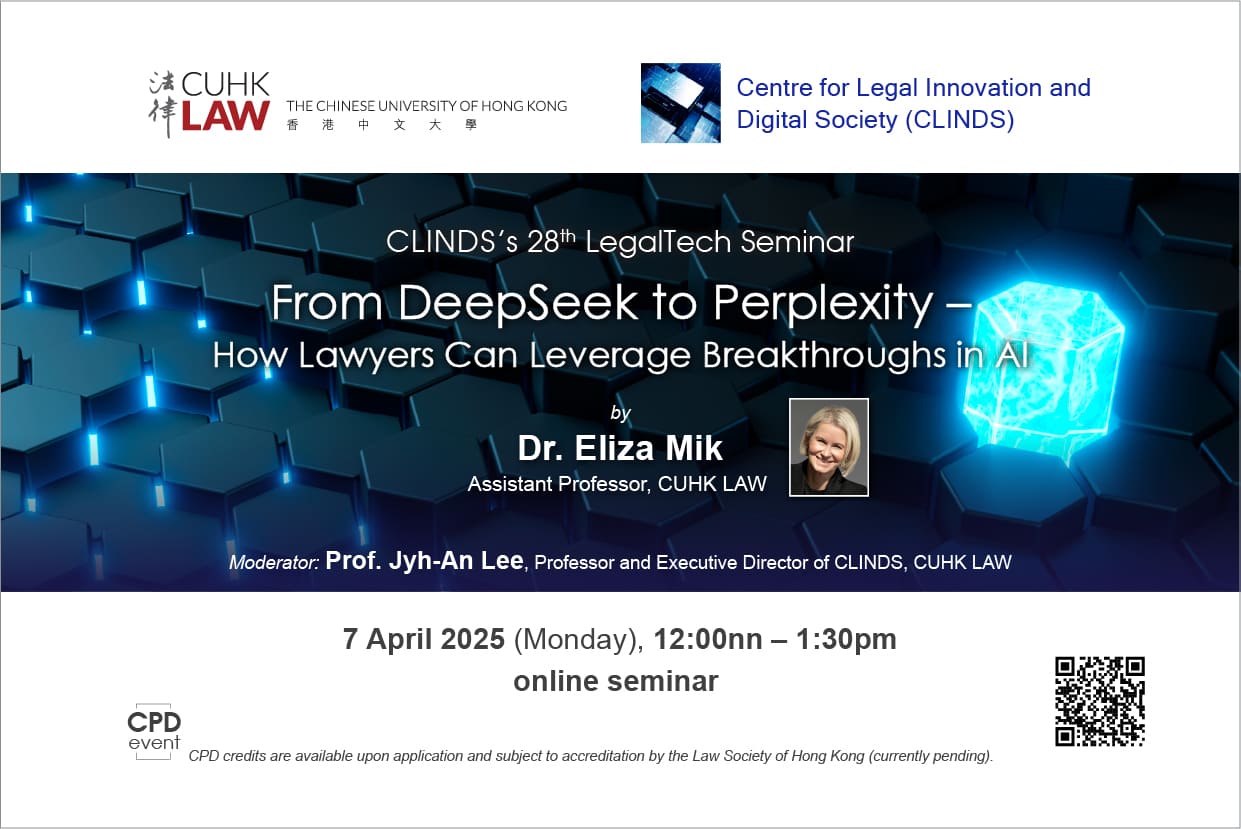Events
CUHK LAW CLINDS’s 28th LegalTech Seminar – ‘From DeepSeek to Perplexity – How Lawyers Can Leverage Breakthroughs in AI’ by Prof. Eliza Mik (Online)
7 Apr 2025
12:00 pm – 1:30 pm
Online (Zoom)
Dr. Eliza Mik has joined the CUHK Faculty of Law in January 2021. Before academia, she worked in-house for a number of software and telecommunications companies in Australia, Poland, Malaysia and the United Arab Emirates. She advised on software licensing, technology procurement and e-commerce regulation. Dating back to her PhD thesis, Eliza’s interests have always centered on the private law aspects of e-commerce and on general problems of transaction automation, particularly with the use of technologies commonly referred to as Artificial Intelligence. Eliza is also one of the most cited authors on the topic of “smart contracts.” In recent years, as part of a research grant, her academic explorations also include the use of large language models in the legal profession. At present, she is a member of the UNCITRAL Expert Group for the Digital Economy, a member of the Inclusive Global Legal Innovation Platform on ODR (iGLIP, Hong Kong), a Research Associate at the Tilburg Institute for Law, Society and Technology (TILT, Netherlands) and an Affiliate Researcher with the Centre for AI and Digital Ethics at the University of Melbourne (CAIDE, Australia).
Much has changed since the introduction of ChatGPT in November 2022. It is, in fact, difficult to keep up with the relentless stream of news regarding new AI-based tools. Each week we are informed of new developments, each of them (purportedly) groundbreaking and unprecedented – at least if we choose to believe the mainstream press and the marketing efforts of major software vendors. To recall, the introduction of DeepSeek’s R1 model in the end of January sparked a major sell-off in NVIDIA stock and marked China’s arrival on the international LLM arena. Maybe it is unnecessary to rely on big US-based software vendors after all; maybe large investments in hardware are not justified. Leaving aside questions of intellectual property and AI regulation, we must ask: which of the LLM-based products are of direct relevance to the practicing lawyer? Which can be useful in the performance of everyday tasks? Even the less technically-inclined lawyers face the prospect of being left behind unless they catch-up with developments in this field. Some LLM-based tools can, indeed, result in efficiency gains. Others are outright dangerous to use – unless their users exercise extreme caution and verify each generated output. Is it more efficient to expend resources to do things in a traditional manner or to deploy LLMs? As it turns out, everything depends on the task and the tool at hand. Legal research differs from legal reasoning and tools that are suitable for student papers may not be suitable in the performance of high-risk tasks. Lawyers must not only evaluate LLMs in light of potential efficiency gains but also heed privacy and confidentiality concerns.
The seminar addresses the following questions:
• What are the most important recent developments in AI that are directly relevant to practicing lawyers?
• What are the best AI-based tools that can be used in legal practice?
• What are the legal tasks amenable to automation?
• What is the significance of DeepSeek?
• Have LLMs become more “trustworthy” and reliable?
Lastly, the seminar will clarify some technical terms, such as “inference” or “context window,” that are indispensable to understand the capabilities of the multitude of available LLM-based tools.
Language: English
CPD credits are available upon application and subject to accreditation by the Law Society of Hong Kong (currently pending).


